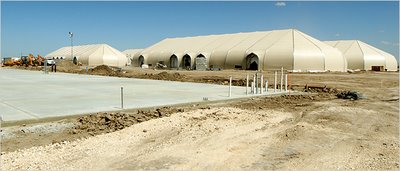
[Image: A partially inflatable immigrant-detention center, photographed by The New York Times – though their article is now pay-per-view].
Between statelessness and Westphalian sovereignty you apparently get inflatable architecture, instant cities on the carceral edge between two systems of power: "As the Bush administration gets tougher on illegal immigration and increases its spending on enforcement," the New York Times reported last week, "some of the biggest beneficiaries may be the companies that have been building and running private prisons around the country."
This is referred to as the "detention market," and it is "projected to increase by $200 million to $250 million over the next 12 to 18 months" – an astonishing increase of 400%. (Invest now).
These "beds within the border region" are managed with Wal-Mart-like efficiency. Indeed, making beds "available quickly is considered an advantage in the industry since the government’s need for prison space is often immediate and unpredictable. Decisions about where to detain an immigrant are based on what is nearby and available. Immigration officials consider the logistics and cost of transportation to the detention center and out of the country."
All of which defines a new political space wherein real-time logistics, transport infrastructure, the rise of the market-state, private investment, and post-Archigramian inflatable architecture strangely merge.
Two quotations seem appropriate here, both taken from Philip Bobbitt's recent – and extraordinarily dense – look at historical mutations within the concept and practice of constitutional sovereignty.
As the nation-state is superceded by the market-state, Bobbitt explains, we are witnessing a clash of tactical responsibilities: "What is appropriate for the market-state – with its porous territorial concepts and its responsibility to preserve the opportunities for personal development, including, of course, access to a safe environment – seems to clash with the absolute sovereignty of a nation-state taking steps it alone can determine are necessary, within its territory, to protect the nation." Of course, this is exactly what we see today in the U.S. immigration debate: an argument for the economic necessity of immigrant labor, including financial opportunity for all, vs. an argument for national border security and the protection of legal citizens.
"There is a grotesque disparity," Bobbitt writes, "between the rapid movement of international capital and the ponderous and territorially circumscribed responses of the nation-state, as clumsy as a bear chained to a stake, trying to chase a shifting beam of light."
The almost Dr. Seussian world of inflatable immigrant-detention camps, as explored by The New York Times, is perhaps evidence of this sovereign clumsiness.
(The NYT article was also covered by Bryan Finoki over at Subtopia; meanwhile, a rather old BLDGBLOG post explores the idea of "criminal aliens needing beds").
No comments:
Post a Comment